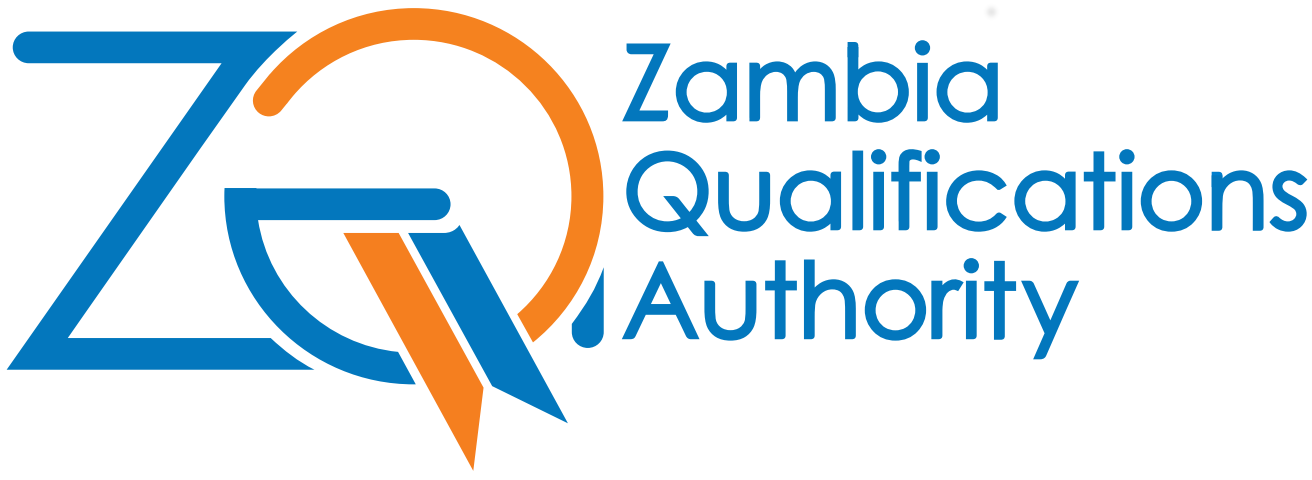



About Zambia Qualifications Authority
The Zambia Qualifications Authority is the custodian of all Zambian qualifications and the reference point for all non-Zambian qualifications. Its goal is to professionally regulate qualifications and promote quality in education, training and employment for all stakeholders through the Zambia Qualifications Framework.
Vision
“A credible regulator of national qualifications for comparability”
Mission
To manage the Zambia Qualifications Framework (ZQF) to ensure recognition and comparability of qualifications
Core Values
Integrity
We put the obligations of the Authority above one’s personal interests and conduct ourselves in a manner that is beyond reproach
Team Work
We cooperate with others and work to the best of our abilities, despite any personal conflict that may arise between individuals to foster unity of purpose
Excellence
We provide superior and meritorious services beyond our clients’ expectations.
Confidentiality
We are trustworthy by not revealing or disclosing privileged information to unauthorised persons
Zambia Qualifications Framework
The Authority shall, with the approval of the Minister, develop and implement a National Qualifications Framework for the classification, accreditation, publication and articulation of quality assured national qualifications.
The scope of the Zambia Qualifications Framework (ZQF) comprehensively covers all learning achievements and pathways. The ZQF provides a basis for improving the quality, accessibility, linkages and public or labour market recognition of qualifications within Zambia and internationally.
The ZQF indicates the comparability of different qualifications and how one can progress from one level to another, within and across occupations, industrial sectors, vocational and academic fields.
As provided for under the Act No. 13 of 2011, the objectives are to:
- Create a single integrated national framework for learning achievements;
- Facilitate access to, and mobility and progression within, education, training and career paths;
- Enhance the quality of education and training;
- Promote education, training and employment opportunities;
- Contribute to the full personal development of each learner and the social and economic development of the nation; and
- Develop, foster and maintain an integrated and transparent national framework for the recognition of learning achievements; and ensure that educational qualifications meet appropriate criteria, and are internationally comparable. These are to be achieved by working together with other appropriate authorities in Zambia.
The ZQF integrates three sub-frameworks namely General Education, Trades and Occupation, and Higher Education. It further assigns ten (10) levels of qualifications to the national framework. The ten (10) levels are defined by learning outcomes that are in the form of qualification descriptors. The Qualification Levels, Sub-frameworks and Quality Assurance bodies of the ZQF.


Background
In the year 2016, the Zambia Qualifications Authority working with various stakeholders in the education and training sector developed and implemented a ten (10) level National Qualifications Framework (NQF) called the Zambia Qualifications Framework (ZQF). The ZQF provides for the classification, accreditation, publication and articulation of quality assured national qualifications. It is made up of three (3) Sub Frameworks namely:
- General and Further Education and Training, covering qualifications from level 1 to 2B;
- Trades and Occupations, catering for qualifications from level 3 to 6; and
- Higher Education, for qualifications from level 7 to 10.
In addition, the ZQF consists of Level Descriptors at each of the ten (10) qualification levels that prescribe the expected learning outcomes of a qualification at a particular level.
Fig 1: The Current ZQF


Rationale for the review of the current ZQF
Notwithstanding the positive impact that the Zambia Qualifications Framework has had on the quality and relevance of qualifications in the country, a number of gaps have been identified in both the Structure and Level Descriptors of the Framework, necessitating their review. The main motivations for the review were to:
a) Ensure the Framework is kept current and continues to respond to changing education and training demands in the country, in line with the ZAQA Act No. 13 of 2011;
b) Ensure continued regional and international comparability of Zambian qualifications and standards;
c) Cater for requirements for recognition of qualifications presently not catered for on the Framework, e.g. Advanced Level (A-Level), Skills Awards, Trade Certificates II and III, etc.; and
d) Provide for the implementation of the Credit Accumulation and Transfer Systems (CATS).
In light of the foregoing, the Cabinet of the Government of the Republic of Zambia at its 14th (Special) Meeting held on 21st May, 2020 granted the Ministry of Higher Education approval, in principle, for the review of the Zambia Qualifications Framework (ZQF).
Proposed changes to the current ZQF
The main changes that have been proposed to the current ZQF are as follows:
a) Adoption of a semi-circular (cyclic) structure to replace the current vertical presentation of the Framework;
b) Review and realignment of ZQF Level Descriptors
c) Review of the Schooling System from the current 7-2-3 to 6-4-2 by:
(i) Realignment of the duration of the Primary School Certificate (Grade 7) duration from 7 to 6 years;
(ii) Abolishing of Junior Secondary Education Certificate at the 9th Grade;
(iii) Realignment of the duration of the Secondary Education – Ordinary Level Certificate from 5 years to 4 years;
(iv) Introduction of Secondary Education – Advanced Level Certificate after Ordinary level (for 2 years) at Level 3, under the General and Further Education and Training Sub Framework;
d) Introduction of a Credit Accumulation and Transfer System;
e) Introduction of Level 1 Certificate (Skill Awards &Trade Test III), under the Trades and Occupations Sub Framework;
f) Introduction of Level 2 Certificate (Trade Test II), under the Trades and Occupations Sub Framework;
f) Introduction of Diploma at Level 6 under the Higher Education Sub Framework; and
g) Reviewing Post Graduate qualifications by introducing the Bachelor Honours Degree, Graduate Certificate & Graduate Diploma at Level 8.
Fig 2: Proposed New Qualifications Structure

Progress made on the review of the current ZQF
- The revised Zambia Qualifications Framework structure has been prepared;
- ZQF Level Descriptors have been revised;
- Guidelines for the Development of Credit Accumulation and Transfer Systems have been developed to facilitate for the implementation of Credit Accumulation and Transfer in the country;
- The current ZAQA Act No. 13 of 2011 is undergoing review to provide for the implementation of the revised ZQF; and
- Stakeholder consultations on the revised ZAQA Act have been undertaken at national, regional and international levels, to be followed by validation engagements at national level, before consideration by Cabinet.
Education and Training Institutions
ZQFs present opportunities for education and training institutions to:
- become innovative in delivery of education and training, focusing on the attainment of learning outcomes;
- design different education and training modes for different learners,
- introduce flexibility in education and training delivery by being “learner-centered”;
Government
The establishment of the ZQF will present the following advantages to Government:
- Qualifications will act as the “driver” of education and training reforms. This will be achieved through (i) improving the flexibility of education and training systems, (ii) widening participation, and (iii) enhancing the mobility of learners and potential learners.
- An ZQF provides an instrument for making educational and training institutions more accountable for the achievement of learning outcomes.
- An ZQF provides quantitative measures for comparing different national systems.
Learners
ZQFs present the following benefits for learners:
- Learners know what they have to know in order to obtain recognition;
- Opportunities for learners to choose their own learning paths, towards a qualification;
- Opportunity for learners to move both vertically and horizontally in the framework;
- Opportunities for life-long learning and;
- Recognition of Prior Learning.
Employers
The ZQF presents the following advantages to employers;
- A qualification will represent a known and recognised level of educational attainment and/or skills;
- The employer knows what the learner knows and work assignments can be tailored to the level of knowledge or skills of the employee;
- The wage structure of the company can be rationalised on the basis of attainment of recognised qualifications;
Regional Integration and Trade
ZQFs provide possibilities for enhanced regional (SADC) co-operation through:
- Mobility of skills across the SADC region, as a consequence of increasing cross-border investments and trade;
- Increased ability of companies to operate in different countries of the region, using local skills in each country;
- Enhanced ability to harmonise skills development efforts.
Board Members








Management Team






Annual Reports
Click the cover image to download a PDF of the respective Annual Report
Legislation
The Zambia Qualifications Authority Act No. 13 of 2011 was enacted by the Government of the Republic of Zambia to “provide for the development and implementation of a national qualifications framework; establish the Zambia Qualifications Authority; provide measures to ensure that standards and registered qualifications are internationally comparable; and provide for matters connected with, or incidental to the foregoing”.
Guidelines & Policies
The following technical documents can be downloaded:
Vacancies
Human Resource Specialist
ZAQA is currently seeking the services of a suitably qualified person to fill the position of HUMAN RESOURCE SPECIALIST (01)
Overall Responsibilities To facilitate the implementation of human resource policies and strategies and ensure that the human resource as well as the administrative support functions of the Authority work efficiently and effectively.
Qualifications and Experience:
- School Certificate;
- A Bachelor’s Degree in Human Resource Management or any related qualification;
- A member of the Zambia Institute of Human Resource Management;
- Minimum of 3 years’ relevant experience in Human Resource Management at middle management level;
The detailed Job Descriptions can be DOWNLOADED HERE
Interested candidates meeting the above specifications should apply enclosing their CVs and certified copies of qualifications using the form opposite or in writing to The Director and Chief Executive Officer Zambia Qualifications Authority Finsbury Park, Kabwe Roundabout P O Box 51103 LUSAKA
The closing date for receiving applications is Friday, 24th July 2020.
ONLY SHORTLISTED CANDIDATES WILL BE RESPONDED TO. ANY SOLICITATION WILL RESULT IN IMMEDIATE DISQUALIFICATION OF THE APPLICANT

P.O. Box 51103, Finsbury Park, Ground Floor,
Kabwe Round-About, Lusaka, Zambia
- +260 211 843 050
- +260 963 922 730
- +260 972 559 301
info@zaqa.gov.zm
Open Monday - Friday 0800h - 1700h
Designed by Chisenga Multimedia




















